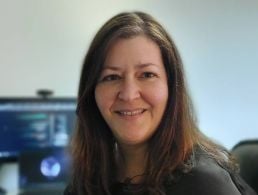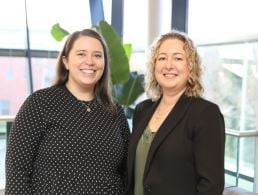Fidelity’s Addison Ying talks to us about her career journey, her move from China to Galway, and her favourite parts of working in data analysis.
For Addison Ying, her interest in data analysis began while she was studying marine chemistry at the Dalian Maritime University in China, specifically her work in the lab where she spent a lot of time experimenting and analysing results for patterns and insights.
“Results were used to test hypotheses, define better experiments and generate new ideas – the classic experimental research approach,” she says. “To perform data analysis, I had to develop my technical skills and that’s where my interest in data analysis began.”
In her final year of university, she joined Fidelity Investments’ intern programme to work in quality assurance (QA), where she discovered the fast pace of the tech field. “Every day was a learning day, it was demanding and I had to adjust to smaller wins versus the longer-term experiments that I was familiar with.”
However, she says that the skills she learned were applied “immediately”, and she became more familiar with skills like problem-solving, fixing bugs and developing product features.
“That internship helped focus my career interest area on IT and I joined the program and project management team in Fidelity’s Corporate Technology Group as a QA engineer and have not looked back since.”
Now, Ying works as a principal data analyst in the enterprise data architecture and engineering product area at Fidelity.
‘Data is the engine that drives everything in our lives’
Tell me about your current role as a principal data analyst and what it entails.
I work in the Fidelity architecture and engineering area on an initiative that is building an analytics platform for customers to identity and profile data. My area of responsibility is to build the data models needed for customer analytics. Engaging with enterprise business stakeholders to understand the customer’s journey, their preferences and experience is used to help in their design. Applying analytics then helps Fidelity improve the customer experience and personalise service-driven business growth through targeted marketing. My role requires me to operate across other roles and functions such as architecture and product development. My soft skills of engaging, recommending and influencing in the modelling areas are as important as my data technical skills.
What was it like moving from Dalian, China to Galway in Ireland? What were the biggest challenges during this time and how did Fidelity support you?
I’ve been in Ireland for five years but still remember the excitement of when I first came here. Between Fidelity’s relocation program and the support of my colleagues, starting a new life here in Ireland was quite smooth. I got to experience new things such as playing tag rugby, I wasn’t familiar with ‘going for a pint’, I learned how to drive and as my colleagues say, I ‘got on the property ladder’. Galway is my second hometown and I enjoy both my work and personal life here.
When I first came here my biggest challenge was trying too hard to fit in at work. I was overly agreeable and rarely expressed different opinions. In hindsight, my thoughts, feelings and behaviours were due to the culture shock and lacking a sense of belonging. It did hold me back from contributing.
I discussed with my manager at that time my apprehension about being different and was encouraged to gradually but incrementally speak up, get involved and ease into contribution. Once I realised that my cultural background and its distinctive perspective was a positive, I gradually became more open to sharing my opinions. I developed what I call my ‘contribution rhythm’. Developing relationships with colleagues made it easier.
Is there anything that you know now that you wish you knew when you were starting out in your career?
It’s feedback, it’s all about feedback. Don’t just seek it but learn how to provide it also. Fidelity is an international company, it’s very diverse so getting on with others, developing relationships and having a growth mindset is very important. At the start of my career, I actively looked for feedback from pretty much everyone for self-improvement and career growth.
Providing feedback was intimidating. It was another type of contribution but this time it was the apprehension of offending that held me back. As I got more experienced, I realised that not only was giving feedback a necessity, it was a skill and like all skills it takes practice. I’ve found it to be a powerful tool for both personal growth and relationship development.
Why are you so passionate about data? What do you enjoy most about your role?
Data is the engine that drives everything in our lives, including the IT world. Dealing with data demands a varied set of skills, a disciplined adherence to best practices and a holistic approach that considers how it is going to be extracted, transformed, stored and consumed later. It is easy to acquire but requires effort to manage, govern and monetise. It’s a fundamental enabler for analytics, making informed decisions, optimising processes and predicting trends. Proper and prolific use can transform a business.
Fidelity is currently undergoing a significant digital transformation that will revolutionise how customers are served and how business is conducted. Being part of this programme presents challenging but varied exposure to business use cases that the team I’m part of will solve. Ultimately being involved in data activities that end up better serving Fidelity’s customers and enhancing their satisfaction is very rewarding.
Do you have any productivity tips that help you through the day?
When it comes to complex tasks that require dedicated concentration time, data analysts will find a ‘best time’ to concentrate without distraction. Dedicate a meeting-free block of time each day when you are at your best. Ironically, I’ve found the virtual work environment works better for this.
Pay attention to your work-life balance but be prepared to be flexible. If you’re working with international colleagues across time zones, chances are that you will have to at least on occasion adopt a flexible working-hours arrangement. I’m fortunate that Fidelity actively accommodates these situations. Despite working different hours when required, I’ve still maintained an excellent work-life balance.
Prioritise and do so with vigour, preferably at the end of every day in preparation for tomorrow. Where priorities do change, try and finish off whatever you’re working on, otherwise it’s wasted effort.
‘Working in analytics allows me to combine my passion for data, problem-solving and continuous learning’
What are the biggest trends you’ve seen in data analytics over the time you’ve worked in the area and which trends are you most excited about?
The most impactful trends I’ve observed have been in how we treat and leverage data. Big data technologies have made it considerably easier to capture, store and analyse massive volumes of data from various sources. Leveraging machine learning (ML) and predictive analytics has become simpler and accessible to a greater number of organisations. Deeper insights and more accurate predictions are more readily achievable. Data velocity has brought with it a growing demand and expectation for real-time analytics capabilities. Organisations are leveraging streaming data technologies to analyse data as it’s generated, enabling immediate insights and faster decision-making.
As a data analyst, I’m particularly interested in the AI and ML advancements. They offer the potential to deliver new routes for extracting insights from data and driving innovation. The increasing focus on democratising data and empowering users with self-service analytics is also another watch area for me as it’s directly fostering a data-driven culture within organisations.
What advice would you give to someone who wants to start working in the area of analytics?
Inform yourself, do your research, be clear on what your interest is and make sure that you take the time to understand what’s involved. Honestly assess your strengths and weaknesses and be clear on whether you are willing to make the time investment needed. The area can be tough to get into so why not learn a bit, try a bit and see if you can find a mentor to work with. Look for opportunities to apply the skills you learned. Real-world problems are preferrable to work with but not essential and results can be used to show to potential employers. Remember to ensure that you understand the concepts and principles involved.
What do you enjoy most about working in AI/analytics?
I am a big fan of mystery novels and mystery TV shows. A good data analyst is not dissimilar to a detective. The puzzle is decomposed piece by piece as the facts emerge and you can often be taken on different paths, including cul-de-sacs before the understanding emerges or insight gained. Every analysis effort is that bit different.
It’s the challenge of tackling a complex problem that engages me. I enjoy the combination of ‘extracting’ and building data understanding, crafting the actual customer data and collaborating with colleagues to gather the domain knowledge necessary to help unlock insights and draw conclusions. Overall, working in analytics allows me to combine my passion for data, problem-solving and continuous learning.
Find out how emerging tech trends are transforming tomorrow with our new podcast, Future Human: The Series. Listen now on Spotify, on Apple or wherever you get your podcasts.




